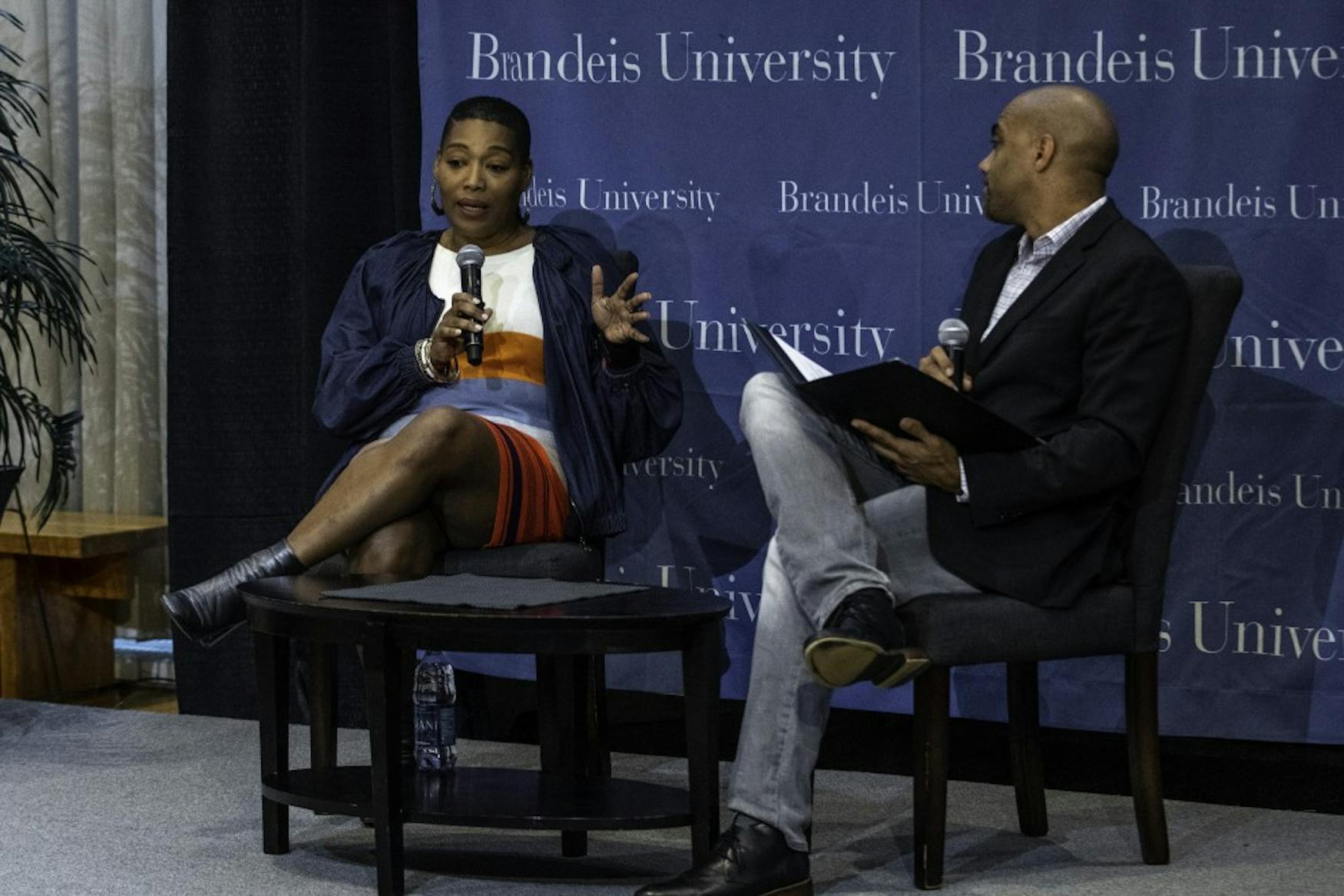Author reflects on Lauryn Hill’s ‘Miseducation’
Journalist and feminist author Joan Morgan explored the relationship between hip-hop, feminism and musician Lauryn Hill — an American singer, rapper and songwriter — in a Wednesday event sponsored by the Department of African and Afro-American Studies, the Creativity, Arts, and Social Transformation program, the Music department and the Dean of Students. The event, titled “20 Years of The Miseducation of Lauryn Hill: A Conversation with Joan Morgan,” began with Prof. Chad Williams (AAAS) introducing Morgan, author of “When Chickenheads Come Home to Roost: A Hip-Hop Feminist Breaks it Down” and “She Begat This: 20 Years of the Miseducation of Lauryn Hill.”
Williams introduced Morgan as “an award-winning cultural critic, feminist author and a pioneering hip-hop journalist.” Morgan was born in Jamaica and raised in the South Bronx. “Ms. Morgan is hip-hop,” Williams said.
The talk initially focused on the social climate that hip-hop was born in at the end of the 20th century. At the time, Jamaican musician Bob Marley was not popular in United States, even though his music was beloved throughout Africa. According to Morgan, DJ Kool Herc, a Jamaican-American DJ, knew that he could not play the Jamaican records or reggae albums he listened to for his audience. “Herc said, ‘I know what to do with the technology. I know that I can’t play these Jamaican records that I play in my home but I can do this thing where I will mix them up and create a different kind of rap beat.’ … So we consider him the father of hip-hop,” Morgan explained. She said this was Herc’s way of “dealing with his Jamaicanness” in America.
Describing her own identity, Morgan said she considers herself Jamaican but noted, “Jamaicans consider me Jamaican, but they are quick to remind me that I am not Jamaican in the way as someone who grew up in the island.” She added, “I don’t have an identity that fits easily into an African American historical experience.” Because of this, Morgan said she always sits “outside the frame.” That is how her “lens is naturally positioned — just to see something outside of frame,” and she bases her analysis on that.
Morgan then discussed her career writing journalistically about hip-hop in the 1990s. Major critics of hip-hop at the time were white, but she thought it was important for people raised with the culture of hip-hop to write about it. “We were not the first people to write about hip-hop. We were the first people of color to write about hip-hop. So I would pick up Spin and Rolling Stones, and it is basically all these Ivy League white boys who were writing about the music and the culture, just simply was not where they were from.”
Morgan decided to write about hip-hop instead. “I love this thing, … I come from it, and [that] gives me the right to talk about it,” she said.
Williams asked what makes “hip-hop feminism,” a term Morgan coined in “When Chickenheads Come Home to Roost,” distinct from Black feminism. Morgan highlighted that hip-hop feminism comes from a specific period. Morgan explained that while she learned about feminism in college, her friends at home were using hip-hop as a way to have conversations about gender. The feminist theory she studied in college through writing and fiction lacked an important part of her identity. “What I felt was missing in that body of written work was that I was not picking up something that said I am a product of hip-hop generation and this is how I articulate feminist identity.”
Morgan then talked about Lauryn Hill, the subject of her recent book. Morgan explained that she did not talk to Hill while writing the book because she only wanted to focus on Hill’s album, “The Miseducation of Lauryn Hill,” not Hill’s current life.
She addressed the question of whether Hill is feminist. Morgan emphasized that she thinks it is important to hear artists call themselves feminist before starting a conversation about their feminism. Hill has never said she is a feminist, Morgan explained, so she sees no point in framing her as such, even though others often do.
Williams’ class, “Hip-Hop History and Culture,” read Morgan’s book as a part of the class, and his students attended the event. Maya Satin ’19 told the Justice, “I just think it is really valuable to have someone of her stature and her background to come and speak with us. She has so much knowledge. Lectures are nice and Prof. Williams does them well. … But as far as an educational experience goes, you cannot get much better than someone who has literally wrote a book on the subject.”
Kariyana Calloway ’19, an Undergraduate Department Representative for AAAS, said, “One thing that I learned is the sincerity and the genuineness of Lauryn Hill’s experience. Most specifically, … how Hill’s experience as a Black woman shaped what the language of ‘Miseducation of Lauryn Hill’ was.”
She continued, “I think that not a lot of people create space for Hill to step into and be her most Black woman self or just to be herself … [Morgan] allows us to understand the humanity of the contemporary moment that the album was created in, but also just the experience and what it meant for Hill to create that album and to give language to the experience of the so many Black women in that time.”



Please note All comments are eligible for publication in The Justice.